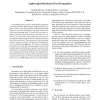Free Online Productivity Tools
i2Speak
i2Symbol
i2OCR
iTex2Img
iWeb2Print
iWeb2Shot
i2Type
iPdf2Split
iPdf2Merge
i2Bopomofo
i2Arabic
i2Style
i2Image
i2PDF
iLatex2Rtf
Sci2ools
109
click to vote
ICDM
2007
IEEE
2007
IEEE
Lightweight Distributed Trust Propagation
Using mobile devices, such as smart phones, people may create and distribute different types of digital content (e.g., photos, videos). One of the problems is that digital content, being easy to create and replicate, may likely swamp users rather than informing them. To avoid that, users may organize content producers that they know and trust in a web of trust. Users may then reason about this web of trust to form opinions about content producers with whom they have never interacted before. These opinions will then determine whether content is accepted. The process of forming opinions is called trust propagation. We design a mechanism for mobile devices that effectively propagates trust and that is lightweight and distributed (as opposed to previous work that focuses on centralized propagation). This mechanism uses a graph-based learning technique. We evaluate the effectiveness (predictive accuracy) of this mechanism against a large real-world data set. We also evaluate the computatio...
Related Content
| Added | 03 Jun 2010 |
| Updated | 03 Jun 2010 |
| Type | Conference |
| Year | 2007 |
| Where | ICDM |
| Authors | Daniele Quercia, Stephen Hailes, Licia Capra |
Comments (0)

